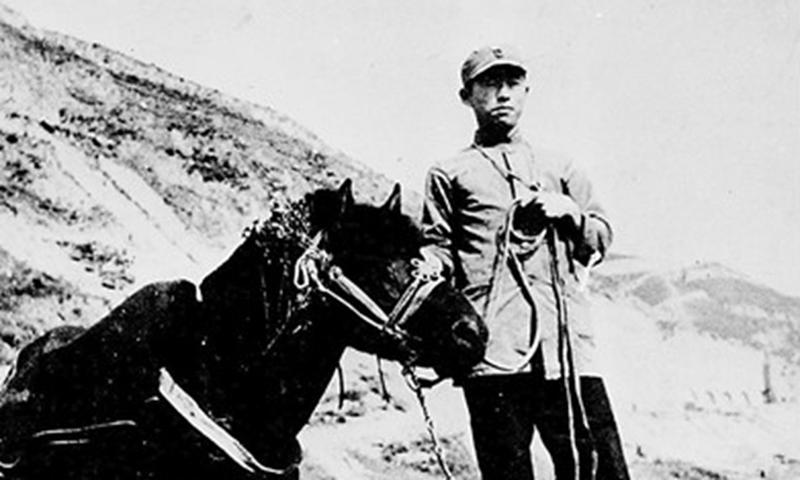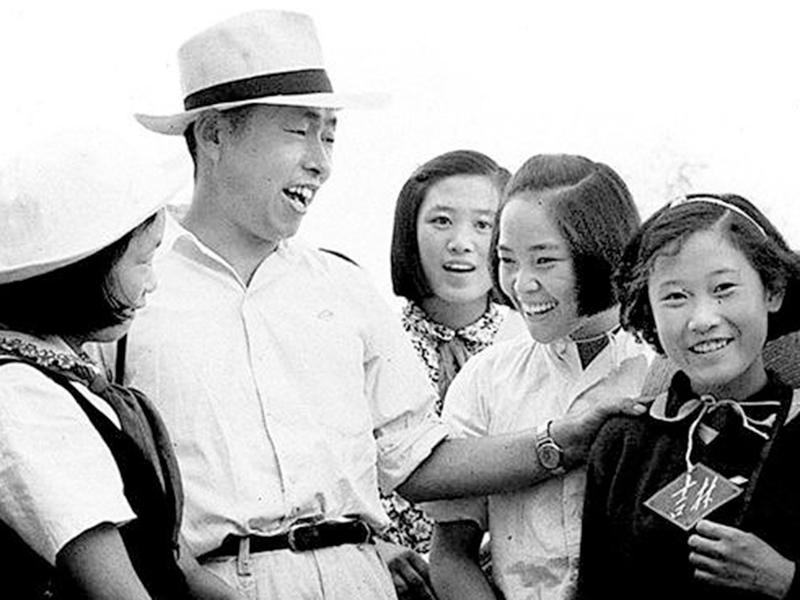 Zheng Lyucheng in Yan’an. (PHOTO PROVIDED TO CHINA DAILY)
Zheng Lyucheng in Yan’an. (PHOTO PROVIDED TO CHINA DAILY)
“The setting sun shines on the tower on the hill. The fireflies at the riverbank bask in the shimmering moonlight. The spring breeze drifts across the plain fields, and the hills form a solid shield. Ah, Yan’an …”
The moving lyrics from the song, Ode to Yan’an, touched the hearts of many when it was heard at an evening cultural gala held at a meeting hall in Yan’an, Shaanxi province, in the spring of 1939. The night’s first performance, it was sung by soprano Tang Rongmei and tenor Zheng Lyucheng, the song’s composer.
The magnificent performance was applauded by Chairman Mao Zedong.
Like Nie Er and Xian Xinghai, Zheng is recognized as one of New China’s outstanding composers. He was among the pioneers of the nation’s proletarian revolutionary music.
Also known as the father of Chinese military songs, he composed more than 300 pieces of music, including the military anthem of the People’s Liberation Army.
But unlike other famous composers, Zheng was actually from the Korean Peninsula.
In 1914, Zheng, who was originally named Zheng Fu’en, was born into an impoverished family in Gwangju, a city in today’s Republic of Korea. As a child, he suffered from stuttering or stammering. At the same time, however, he also displayed an unusual talent for music. He was then taught various instruments from an early age, including the violin. Later, he changed his name to Lyucheng, which means “composing lyrics”, due to his love and passion for music.
In the first half of the 20th century, a great number of revolutionaries fought for their national independence against Japan’s militarist aggression toward East Asian countries.
Zheng lost his father when he was young, but he had already instilled a deep patriotic influence on his family. All three of his elder brothers sacrificed their lives fighting against Japanese aggression.
In 1933, many of those revolutionaries also came to China and joined the country’s resistance against Japan. Zheng was among them. But he did not give up his musical studies and instead kept practicing and learning more in his spare time.
After the Marco Polo Bridge incident on July 7, 1937, Zheng and many other young revolutionaries went to Yan’an, back then a sacred place of democracy and freedom in the country and the cradle of most patriotic songs of that time. Singing resounded everywhere in Yan’an, making the city an ocean of song.
In such an environment, Zheng spared no time to study and compose music. There he felt the strong conviction of the Communist Party of China and the Eighth Route Army, and the solemnity of Yan’an as a sacred place of the revolution. He also witnessed the hardships alongside the simplicity and dynamism of life in Yan’an.
One evening in the summer of 1938, Zheng, still a student in the department of music at Lu Xun Academy of Fine Arts, or LXAF, attended an assembly of local people in Yan’an together with his schoolmates.
On their way back to school after the assembly, crowds were still talking about national affairs in high spirits, full of optimism about the country’s future. Students of the Military and Political University of Resistance Against Japanese Aggression walked in lockstep with vigor, singing nationalistic songs. These touching scenes kindled Zheng’s passion for songwriting.
 Zheng interacts with children. (PHOTO PROVIDED TO CHINA DAILY)
Zheng interacts with children. (PHOTO PROVIDED TO CHINA DAILY)
With his deep love and admiration for the CPC, the Eighth Route Army and Yan’an, Zheng worked around the clock to compose music. With lyrics written by Mo Ye, a poetess from LXAF, Ode to Yan’an was completed. Zheng once recalled that when composing the song, Yan’an was still a desolate place with no trees on the hills, and life was hard.
However, Yan’an was a sacred place of revolution, and the beacon of hope for the Chinese people. People from all over the country went there with revolutionary aspirations, and from there, the sparks of revolution spread across China. Yan’an was full of dynamism, passion and great songs, Zheng recalled. He fell deeply in love with this vibrant, youthful place.
Day and night, he worked to complete what became a beautiful, uplifting and inspiring song for Yan’an. Zheng did not major in music composition at the time, but his passion for revolution prompted him to pick up the pen. There were no instruments at his disposal, however, except for one violin, which he found a bit monotonous.
To write his tunes, he would knock on tables or hit stones to get the notes, or climb mountains in Yan’an and hum to himself, in high and low voices, while hiding in cave dwellings. It was an excruciatingly difficult environment for composing music.
Ode to Yan’an conveyed the deep affection for the city where tens of millions people lived through the revolutionary years. During the War of Resistance Against Japanese Aggression (1931-45), the piece not only expressed people’s love for the sacred place, but also inspired countless young patriots to enter the battlefield for the country.
In 1939, Zheng joined the CPC. Two years later, he married his love Ding Xuesong in Yan’an. To prepare for their wedding, the couple went on a hunting trip, bringing home two gazelles to serve the guests at the ceremony.
In 1942, he listened to the teachings of Mao Zedong at Yan’an Forum on Literature and Art.
Soon after China won the war against Japan in 1945, he returned to the Korean Peninsula for work. In 1950, with the approval of then-premier Zhou Enlai, he was able to return to China with his wife, Ding, from the Democratic People’s Republic of Korea. She would later become China’s first female ambassador in 1979.
Zheng became a Chinese citizen in 1950. Staying in Beijing, he worked for various organizations including Beijing People’s Art Theatre.
In the 1950s, he began traveling widely around China to collect materials and find inspiration for his music. Zheng went into factories, rural places and border areas, leaving footprints throughout the country to constantly look for new, creative themes, and composing a vast amount of musical pieces.
Zheng died of cerebral hemorrhage on Dec 7, 1976.
In 1993, Ode to Yan’an was included in the list of Chinese music classics of the 20th century, securing a place in China’s musical history.
While Zheng spent most of his adult life in China and made a successful career penning military songs, not many — even those familiar with his works — know about his time in Korea.
To allow more people to learn about his life story and promote friendly communication between the ROK and China, local authorities in Gwangju have in recent years regularly mounted exhibitions centered on his childhood home.
The street where Zheng’s childhood home is located has been renamed “Chung Yul-song Street,” following the Korean pronunciation of his name. Visitors will be able to see a memorial hall in honor of the renowned composer, featuring pictures and statues depicting Zheng’s life.
Praising Zheng as the “Art Soul of East Asia,” the memorial hall also shows his biography written in Korean as well as a metal plate commemorating Ode to Yan’an, his most famous piece.
The Gwangju city government began in 2000 to present sightseeing products linked to Zheng’s birthplace.
At the entrance of Chung Yul-song Street is a bronze statue of Zheng, with his name inscribed in Chinese. It was written in person by his wife Ding.
Around 100 meters from it is Zheng’s birthplace. His life and achievements can be read on a plate at the entrance, written in both Chinese and Korean.
Jeong Un-yeong, director of culture and tourism at the Namgu office of Gwangju, told Xinhua that the city government plans to renovate and enlarge the venue into a memorial hall to help make the musician better known to the public, as well as to promote exchanges between China and the ROK.
Kwon Ki-sik, president of the Korea-China City Friendship Association, told Xinhua that public opinion on Zheng in the ROK “is still gradually rising”.
“His revolutionary activities and achievements in Korea and China, as well as his revolutionary career and musical achievements, have deeply moved Koreans,” he said. “He is also an important historical figure, who can play a bridge role in enhancing the friendship between South Korea and China.”
Describing Zheng as a figure representing the fight against Japan’s aggression and symbolizing ROK-China friendship, Kwon voiced hope that both countries join hands to commemorate Zheng to let his story be known to more people.
In 2009, Zheng was honored as one of the 100 heroes and models who made outstanding contributions to the founding of New China.
Xinhua contributed to the story.


